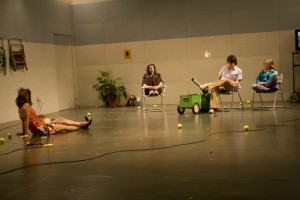
Todd Theatre’s first production of the year, “Brief Interviews with Hideous Men” debuts tonight at 8 p.m.
Tennis balls bouncing slowly back onto stage. Sophomore Kelsey Burritt’s face frozen on the big screen. A girl’s 13th birthday party.
Those were the images that stuck in my head after I left the dress rehearsal for “Brief Interviews with Hideous Men.” So, really, it is those subsequent impressions of mine that are shaping the course of this review, simply because it would not have done justice to talk about this performance of BIWHM any other way. Yes, this is one of those plays.
Potential audiences, take heed. BIWHM is not a play to be taken at face value — it can be interpreted at many levels, as all good plays should. Prepare to see some stripping — and not just of the soul. If you do not have the patience for two hours of monologues, save yourself the time and stay home instead.
When I first met Director Daniel Fish a while back during my English class visit to the set, he had a word of advice for us.
“Leave all expectations at the door,” he said.
Despite having read some parts of David Foster Wallace’s book, which this play was adapted from, I really didn’t know what to expect walking into the Todd Theatre door. However, Fish was right. When I saw a male character from the book so blatantly being played by a female, I was immediately forced to leave all my expectations at the door.
What is important to note about BIHWM is that it does not serve to be theatrical or dramatic — nor does it try to create characters that we’ll hate or love. In fact, it barely tries to create characters. This is humanity brought down to a level at which no one person is dissimilar from the other. No one is better than the next person — whether they’re a Holocaust survivor, a phony lover or a tennis player.
A particular scene that stood out to me was one in which senior John Amir-Fazli told his story. It really captured the essence of the show. As engrossed as I was in his tales of gang-rape and dignity, I found that my eyes would wander around the stage, taking in the whole set at the same time. Since the play is so dependent on the voice of the actors, the other aspects of theater — like lighting, props and music — became actors themselves.
Each one of these stage effects played such a pivotal role in the enjoyment of the play that I vividly remember the transformation from a well-lit, made-up female face to the shadows that began to form under her eyes. During Amir-Fazli’s scene, looking away from him meant looking at the numerous nuns doing the zombie-walk across the stage.
In a strange switch of roles, the actors seemed to have become the props in this play. Do not be fooled by the use of the word “monologues.” There are rarely scenes where one person remains for long onstage. More often than not, there is a flurry of activities, usually the result of the interaction between actors and props, not so much amongst the actors themselves. Human interaction is not a big component of this play.
One last note: mature audiences only. It is printed on the posters but I’m going to reiterate it for you right here. Themes like sexual relations, climaxing habits and pre-pubescent desires will come tumbling out of the actors’ mouths faster than you can say “incest.”
Your morals will be challenged, your faith will be questioned and your hopes in life, dashed.
Also, you’ll have to decide just how comfortable you are with someone saying to you, “What if I do this to you right here? Rape you with the bottle?”
The only comfort I can offer you is this: at least you don’t see the bottle.
Zhee Lim is a member of the class of 2014.

